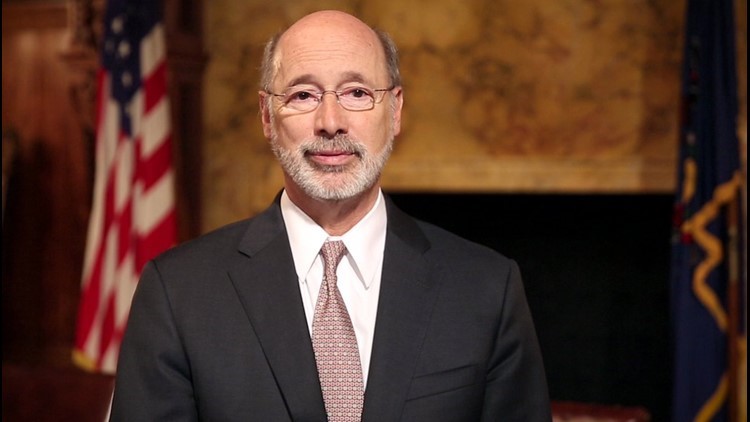PENNSYLVANIA, USA — The Pennsylvania departments of Health and Human Services issued updated guidance to ensure a safe return to activities, visitation and other events for residents in nursing homes, personal care homes, assisted living residences and private intermediate care facilities.
“We continue to practice a careful, measured approach in long-term care facilities so all staff and residents can safely welcome visitors and return to a more normal routine,” Secretary of Health Dr. Levine said. “We developed this guidance through collective input from residents and families, stakeholders, academia and facility representatives to allow safe visitations with strong public health measures to balance the mental and physical well-being of Pennsylvania’s most vulnerable residents. We will continue to work with and support facilities to ensure they adhere to these measures.”
“COVID-19 has presented a tremendous challenge, but long-term care facilities have felt these challenges acutely due to the often fragile health of residents at these facilities. Precautions and restrictions implemented at these facilities were necessary to keep residents and staff safe, but we recognize that they are not permanently sustainable,” said Human Services Secretary Teresa Miller. “Resuming operations for long-term care facilities should be done gradually and deliberately, and most importantly, this must be done safely. Guidance issued today will help this process begin, and we will continue to support our long-term care facilities through every step.”
In order to cautiously lift restrictions in long-term care facilities (LTCFs), the departments of Health and of Human Services will now require all LTCFs to meet several prerequisites before proceeding into the official three-step process of reopening:
- Develop an implementation plan and post that plan to the facility’s website, if the facility has a website, that specifies how the reopening and visitation requirements will be met.
- Administer tests within 24 hours of a resident showing COVID-19 symptoms and complete baseline testing as required in the Secretary’s Orders for skilled nursing facilities issued on June 8 and for personal care homes, assisted living residences, and private intermediate care facilities issued on June 26;
- Develop a plan to allow visitation that includes scheduling and other safety measures;
- Develop a plan for cohorting or isolating residents diagnosed with COVID-19 in accordance with PA-HAN 509;
- Establish and adhere to written screening protocols for all staff during each shift, each resident daily, and all persons entering the facility;
- Have adequate staffing and supply of personal protective equipment for all staff;
- Be located in a county that is either in the yellow or green phase of the Governor’s Reopening Plan; and
Once a facility meets the required prerequisites, the facility will enter a three-step process of reopening:
Step One: From the date the facility enters step one, a facility must maintain no new COVID-19 cases among staff or residents and have no spread in the facility for 14 consecutive days in order to enter step two.
Step Two: While in step two, facilities are required to maintain no new cases of COVID-19 among staff or residents and have no spread in the facility for 14 consecutive days to progress into the final step.
Step Three: The final step allows LTCFs to operate as outlined for the remainder of the Governor’s COVID-19 Disaster Declaration as long as there are no new COVID-19 cases among staff and residents for 14 consecutive days.
If a new COVID-19 case is known, facilities will cease implementing their reopening plan and wait until they have no new COVID-19 cases for 14 consecutive days before re-entering step one.
Each step of the plan includes specific criteria for conducting dining, activities, non-essential personnel, volunteers, visitors and outings.
Visitations will only be allowed in steps two and three as long as the facility determines a resident is able to safely see visitors and will prioritize those with diseases causing progressive cognitive decline and residents expressing feelings of loneliness. A facility must designate visitation hours, locations (preferably outside or a pass-through not typically occupied or frequented by residents), and screenings to permit a visitor into the building. During the entirety of the visit, social distancing and infection control protocols must be followed along with enforcing the proper hand hygiene with alcohol-based hand sanitizer and universal masking. Facility staff will monitor visits so all safety guidelines are met and enforced. After each visit concludes, staff will need to sign out the visitor and properly disinfect the designated visitation location. Guidance for visitors is available here.
Since the beginning of the COVID-19 pandemic, the Wolf Administration has taken a three-pillar approach to protecting the residents living in LTCFs by:
- Ensuring resident safety through testing, education and resources;
- Preventing and mitigating outbreaks; and
- Working in partnership with state agencies, local health departments and LTCF operators.
As of June 19, the Department of Health distributed over 2,300 shipments of personal protective equipment (PPE) to all LTCFs in Pennsylvania. This PPE included 306,944 gowns, 336,559 face shields, 1,023,800 gloves, 2,807,570 N95 masks and 1,175,200 surgical masks. Additionally, the Department of Health continues to work with ECRI as they provide technical assistance and our Healthcare Acquired Infection (HAI) team to further assist and remain connected with the nursing homes in order to best assist their needs.
The Educational Support and Clinical Consultation Program (ESCCP) team, a partnership between DHS, the Jewish Healthcare Foundation, and seven health systems around Pennsylvania, has also provided clinical guidance, advice on infection control strategies, and clinical needs identification to more than 900 LTCFs licensed by DHS and 250 skilled nursing facilities licensed by DOH. The ESCCP program has conducted more than 16 webinars to more than 2,400 participants statewide on topics like proper use of PPE, infection prevention and control methods, and emotional support for residents. In July, the ESCCP program will transition from a voluntary partnership to a contracted grant agreement that establishes Regional Response Healthcare Collaboratives that will provide financial support to contracted health system partners to assist with continued education, clinical support, testing, and other areas necessary to respond to COVID-19. This network will be available to support facilities as they prepare to safely reopen.
The guidance issued today will supersede the previous guidance issued for nursing homes and personal care homes, assisted living residences and private intermediate care facilities. Previously, the ongoing visitor limitations, personnel restrictions, and other measures in LTCFs remained in place at least 28 days after the respective facility’s county enters the green phase in the Governor’s Process to Reopen Pennsylvania.
For additional resources regarding COVID-19 and nursing homes in Pennsylvania, please visit the Department of Health’s COVID-19 Information for Nursing Homes website.
For more information regarding personal care homes, assisted living residences and private intermediate care facilities, please visit the Department of Human Services’ website.
Pennsylvanians are reminded that mask-wearing is required when visiting businesses in both the yellow and green phases of reopening or in any setting outside the home where social distancing is difficult. Remember: My mask protects you; your mask protects me.
SOURCE: DEPARTMENT OF HEALTH



